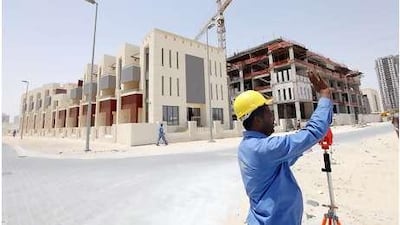Raymond Lefevre, the general manager of Bavaria Gulf Property Development, recognised long ago that building for the masses was not a winning formula in the business of selling homes.
The appetite for high quality among discerning buyers in the company's home country of Germany has helped it to build its only project in Dubai during a global recession and with few setbacks. Thirty-six ecologically designed townhouses at Sandoval Gardens in Jumeirah Village, a sprawling development in a prime location off Al Khail Road, will soon be ready to hand over. "Germany is a market where you can only survive if you are developing for a niche. Either it's a special design or an ecological house," Mr Lefevre says.
The concept is a contrast to the approach taken by many other Dubai developers, which snapped up land during the property boom as they tried to serve thousands of clients. Many of these projects are now at a standstill because the predominantly speculative buyers are struggling or refusing to pay their instalments. But Bavaria and other niche developers are playing the property game differently. Not only did the German company adopt the "small is beautiful" mantra, it was careful to match the fixtures and amenities in the homes, whether water-saving taps or energy-efficient air conditioning, with the promises made in its sale contract. And while the company has paid the full price for another plot of land in Jumeirah Village, it will not sell more new homes until the market recovers.
"A mass production of units is not possible to sell," Mr Lefevre says. "And that's what we did here. We focused on the niche of pure end-users with a focus on quality; this is the only way you can survive as a developer." The approach has meant that while Bavaria has had to negotiate extended payment plans with clients who are in financial difficulty, it has had no defaults. Townhouses at Sandoval Gardens sold for Dh700 (US$190) a square foot when the project was launched in 2007, a year when property prices in Dubai surged almost 80 per cent.
"When we launched, 90 per cent of our clients only bought one unit, and out of these units, maybe 80 per cent are under mortgage finance," Mr Lefevre says. "So it's genuine end-users who bought from us. These people see that the project is being built, which is why they haven't backed out. Some already live in Dubai and wanted to buy a home, while others wanted it for a holiday home or a long-term rental investment."
Still, Bavaria has not been completely immune to the tremors of the economic downturn. The financial problems of the Dubai World-owned developer Nakheel, the master planner of Jumeirah Village, has meant that progress on essential infrastructure has been slow. That said, sub-developers at the project have been assured that it will be one of the first to benefit from an $8 billion cash infusion for Nakheel announced by the Dubai Government in March.
"Things are developing ? but you have to be patient, it's the same with every community in Dubai," Mr Lefevre says. "There's a huge commitment to complete Jumeirah Village ? This is very important for us as a developer and, of course, for our investors." Other boutique developers have followed a similar strategy. CHI Development, a UAE-based company formed by a group of Irish developers, completed 121 villas at the Lime Tree Valley project in Jumeirah Golf Estates late last year.
Lime Tree Valley is the firm's only project in Dubai, for which it received the prize for "best golf development" at the CNBC Arabian Property Awards in 2007. "From a bespoke developer's point of view, there's a lot of merit in being smaller and leaner and more tuned in with individuals' requirements," says Roger Wakeham, the director of development at CHI. "We have more access to clients and they have more access to us. I can't imagine the concerns of having tens of projects on the go at the same time, you lose control and the personal touch."
Another developer of niche property is Dubai Investment Properties (DIP). Last year, the company completed Sunset, a low-rise, glass-fronted apartment building along Jumeirah Beach Road where residents have private beach access and can enjoy sea views from their terraces. It is one of the few residential properties that DIP, which built the Dubai Marine hotel resort, has developed in the emirate. Yet beach-side living comes at a price: a one-bedroom apartment at Sunset rents for Dh200,000 a year. "People pay that because it's special, it's by the beach and away from the hustle and bustle that comes with bigger developments," says a sales agent for the project, who asked not to be named.
"Most of the building is rented out, and it's people who have the cash and want to enjoy it." Projects such as Sunset, Sandoval Gardens and Lime Tree Valley could pave the way for "the next stage" in Dubai's property development, says Craig Plumb, the head of research at the property consultancy Jones Lang LaSalle. "The traditional thinking was 'bigger is better' because it gave developers more opportunities," he says. "But there's definitely going to be an increase in projects on a smaller scale. Even if the market is flat, but you're building something smaller and unique, you will have more ability to sell."
@Email:agiuffrida@thenational.ae

